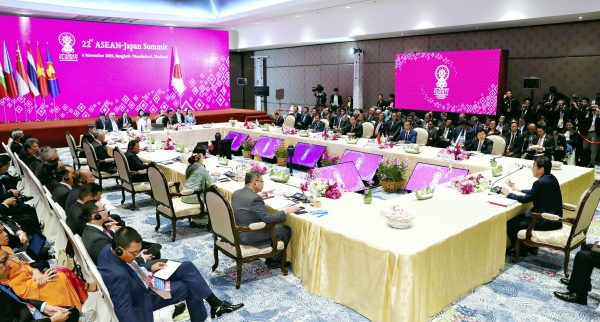A protracted Russia–Ukraine war now seems inevitable. There is a call for more dialogue in US–China relations, but it is unlikely that the United States will loosen its hard-line stance towards China any time soon. China’s military power, scientific and technological capabilities, and the influence it exerts on the back of these capabilities have rung alarm bells. Concern about human rights abuses has also intensified.
A return to inclusive international cooperation seems unlikely. The current emphasis is on classic collective defence. This includes strengthening alliances, with moves to increase NATO’s response force and to admit new countries seeking membership. Japan, South Korea, Australia and New Zealand all participated in the NATO Asia-Pacific Partners Leaders’ Meeting held in conjunction with the NATO summit in Madrid. At that meeting, these countries projected their presence as partners in the Indo-Pacific region, another act of solidarity among nations united in their view of international order.
As seen in its actions through AUKUS and the Quad, Washington is emphasising minilateralism. In May 2022, negotiations for the Indo-Pacific Economic Framework were launched. These efforts attempt to shape a favourable international environment with the United States at its centre. But they are not frameworks that can be used to collaborate with ASEAN or other non-US ally countries in Asia.
In the short-term, these moves, especially those involving security minilateralism, are effective in checking countries that challenge the status quo and enhancing leadership in an increasingly centrifugal international environment. In the long run they are not an effective way to restore order in all issues because the number of participating countries is critically narrow. US President Joe Biden’s vision of order is the source of these limitations.
Japan must assert that the current international order can be maintained. It should work to ensure that civil liberties are protected and that forces that respect freedom, democracy and the rule of law can collectively resist the forces that seek to move towards an illiberal world. This awareness needs to be at the core of Japan’s diplomatic vision.
At the 2022 Shangri-La Dialogue, Japanese Prime Minister Fumio Kishida emphasised the importance of rulemaking. As host of the G7 Summit in 2023, Japan has a responsibility to maintain momentum among major states to protect liberal values and to unite the world. Crucial areas of focus include food and energy security — both severely strained by the Russia–Ukraine conflict and global supply chain issues. Japan also should take on a leadership role in maintaining human rights, in keeping with the global agenda of the G7.
The foreign policy that the ruling Liberal Democratic Party has followed since 2012 — implemented by former prime minister Shinzo Abe and his successors — stands out in terms of the breadth of its global vision. The concept of a Free and Open Indo-Pacific was introduced by Abe and then used by other countries including the United States.
Importantly, Japan has not overemphasised military policy tools. Japan’s defence budget did begin to increase, but this was done incrementally with emphasis on restructuring its legal and institutional basis. Abe led the restoration of relations with Xi Jinping and stabilised Japan–China relations during the Trump administration. Above all, the strong commitment to, and success in, rulemaking — as seen in economic diplomacy, such as Japan’s prosecution of the Comprehensive and Progressive Agreement for Trans-Pacific Partnership — Quality Infrastructure and Data Free Flow with Trust, illustrate the path Japanese diplomacy should take.
The Kishida administration should expand its grand vision to manage the United States’ Asia policy and deploy its own diplomatic power of rulemaking while maintaining dialogue with many countries. The Indo-Pacific Economic Framework is an example of where Biden’s Asian diplomacy has not been liberal and tactful enough. As a US ally, Japan is responsible for co-leading US–Asia diplomacy. Without it, Beijing’s influence could take over international rulemaking.
Partners are indispensable, and Japan and the United States have many to work with, such as Australia, India, the United Kingdom and NATO members. Such partnerships should be security-oriented with a focus on collaboration on cyber and maritime security, and advanced technology.
Regionally, Japan seeks to become a more dependable and visionary country. Next year marks the 50th anniversary of Japan–ASEAN Friendship and Cooperation. Kishida should establish his own doctrine to build the regional political and economic order, while raising awareness of how ASEAN and Japan are indispensable partners.
Kishida will publish his detailed plan for the Free and Open Indo-Pacific in early 2023 and it could promise an increase in Japan’s efforts to support maritime security, digital economy, health care and democratic governance in Southeast Asia, South Asia and the Pacific. The focus should be on the support, not pressure, that Japan will provide to these nations to achieve their goals.
South Korea and Japan are natural partners in respecting democracy and freedom and seek to cooperate in creating order beyond the Korean Peninsula. South Korean President Yoon Suk-yeol has shown his commitment to economic security and Indo-Pacific order-building, a good sign for the future collaboration. It is high time for both governments to promote their multi-faceted bilateral and trilateral cooperation.
This year is the 50th anniversary of the China–Japan Joint Communique of 1972. There is no need to be tolerant of China’s repressive political system and Japan should insist that the peace and stability of the Taiwan Strait is crucial. But diplomacy should be utilised to bring China into the inclusive international order. Japan’s greatest weapon will be not to disengage from China, but to make rules and norms to shape its behaviour and align with partners and focus on long-term objectives.
Ryo Sahashi is Associate Professor at the Institute for Advanced Studies on Asia at the University of Tokyo.

